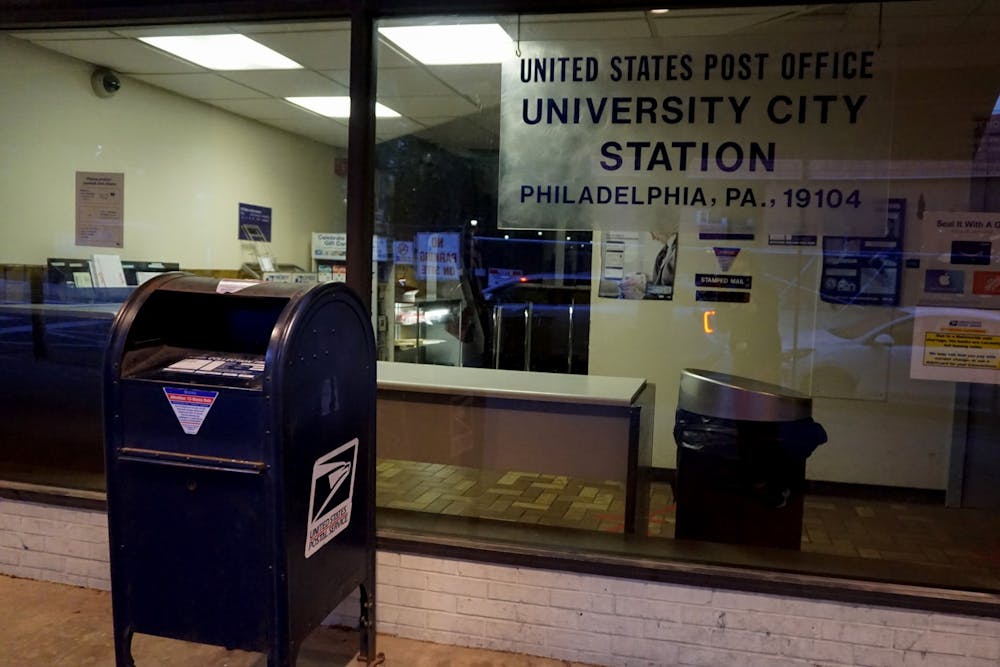
Penn students' absence from campus will affect the presidential election depending on where the students are originally from.
Credit: Sukhmani KaurDue to the coronavirus and Penn's resulting campus shut down, fewer Penn students than normal are eligible to vote in Pennsylvania — a crucial swing state — for this year's monumental presidential election.
Though upperclassmen with residences in Philadelphia remain eligible to vote, most first years never lived on campus, and therefore did not establish a residence and register to vote in the state. With a class of over 2,000 students, Penn Democrats President and College senior Owen Voutsinas-Klose said this decrease in usual college voters could seriously affect local and national elections this fall.
“The amount of people voting at Penn precincts is going to go down significantly from 2016 and 2018. There are going to be less people voting at Penn. There is going to be way less political activism as a result,” Voutsinas-Klose said.
On a national scale, Political Science professor Nancy Hirschmann said that Penn students' absence from campus will affect the presidential election depending on where the students are originally from.
“If [students] live in a solidly red or blue state, then it would have a negative effect because PA is a "swing state," and so their vote would have had greater potential to make a difference if they voted here than if they voted in their home state," she wrote in an email to the Daily Pennsylvanian. "If they live in another swing state, like Michigan or Wisconsin, then their vote has that same potential in their home state.”
As of last year, 19% of undergraduates at Penn were already from Pennsylvania, so their eligibility to vote in the state is unaffected by this year's remote learning style.
Swing states, like Pennsylvania, have a highly divided electorate. These states are known for essentially “swinging” the presidential election in favor of the Democratic or Republican candidate. Florida, Minnesota, Georgia, Michigan, Wisconsin, North Carolina, and Arizona are other prominent swing states.
In 2016, President Donald Trump won the election with the support of several swing states, including Pennsylvania, which he won by only 0.72%, one of the narrowest margins in a presidential election in the state's history. The 1968 Wharton graduate garnered 2,970,733 votes in Pennsylvania, while his opponent Hillary Clinton earned 2,926,441.
But according to Director of Data Sciences at Penn’s Program on Opinion Research and Election Studies and Deputy Executive Director of Penn’s Fox Leadership Program Stephen Pettigrew, Penn student voters' absence in local elections is not as impactful. Pettigrew said local races would likely be unaffected by a decrease in Penn voters because college-aged students are generally more liberal, and Philadelphia is already “heavily democratic.” So in November, Penn students would not be voting in a lot of close local races anyway.
Though Co-Director of Penn Leads the Vote and College junior Harrison Feinman thinks the lack of first years on campus will have a negative impact in the general election, voter turnout for Penn students has been on the rise over the past several years.
“We’d like to think that people will vote at a higher rate this year, which has been the trend in the last few elections," Feinman said. "There were more voters in 2018 than there were in 2014. But that’s going to be difficult because there are less voters here.”
Feinman said that according to the National Study of Learning, Voting, and Engagement, an elections research report by Tufts University, during the 2016 presidential election the voting rate for Penn students was about 50%, below the national average that year of 56%, as well as the Pennsylvania average of 60.2%. But he does think students will be more inclined to vote this year, not just because of the high-profile presidential election, but also due to the momentum of progressive social movements like Black Lives Matter and national unrest heightened by the coronavirus and climate change disasters.
Actually registering people to vote will require more of a self-starting initiative, Feinman said, though the group is trying to make it as easy as possible through their website. They have a tool that will allow people to register to vote in Pennsylvania by signing on a touchscreen.
In the past, many students were unable to register to vote online because they would have to upload a picture of their signature, which has not always worked on the website. The group used to be stationed on Locust Walk during election season for hours, helping students sign registration forms correctly, and then giving them to Penn’s Office of Government Affairs who hand-delivered them to the City Commissioner’s office. Now, it's more difficult to certify that the forms will be filled out correctly.
As a researcher on election turnout, Pettigrew said that the majority of action in terms of registering to vote and updating records occurs in August and September. Typically, political organizers and volunteers go door to door and stand outside at tables to help people register, but this is impossible this year due to the pandemic. Though you can virtually send a URL and other information, “it now takes an extra step to go register," he added.
Pettigrew urges students to carefully heed the advice of Stevie Wonder's "Signed, Sealed, Delivered" when voting by mail.
"The most common reason that absentee ballots get rejected is people forget to sign it where they're supposed to. So, sign it, seal it, and then make sure you deliver it."
The Daily Pennsylvanian is an independent, student-run newspaper. Please consider making a donation to support the coverage that shapes the University. Your generosity ensures a future of strong journalism at Penn.
Donate



